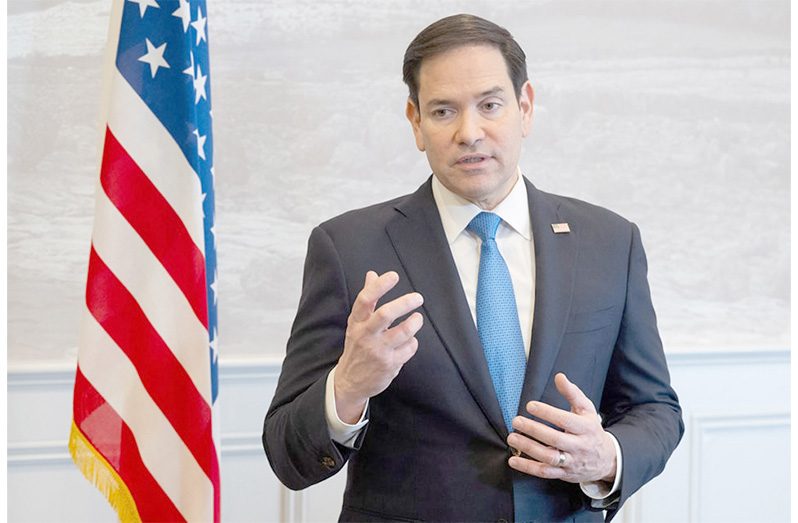-Secretary of State Rubio labels Venezuela’s Maduro regime a criminal enterprise, regional threat
UNITED STATES (U.S.) Secretary of State Marco Rubio has affirmed Washington’s commitment to tackling drug trafficking and narco-terrorism across the Western Hemisphere, singling out threats made against U.S oil companies that are operating lawfully in Guyana.
Addressing questions about U.S. military involvement in countering drug networks, Rubio identified the Cartel de los Soles, a Venezuelan criminal organisation that is masquerading as a government.
“The Maduro regime is not a government. It’s not a legitimate government. We’ve never recognised them as such,” he stated, emphasising that the group operates as a criminal enterprise controlling Venezuelan territory.
Rubio highlighted that these groups utilise international airspace and waters to traffic narcotics into the United States. He added that the Cartel de los Soles has also threatened U.S. oil companies legally operating in Guyana.
“…and who by the way are also threatening U.S oil companies that are operating lawfully in Guyana…The President [Donald Trump] has been very firm. Anything that’s a threat to national security, he’s going to confront,” Rubio said, underlining the administration’s readiness to act against entities endangering both U.S. and regional interests.
Guyana, now a growing hub for oil production, has drawn investment from multiple U.S. companies, with ExxonMobil emerging as the leading operator.
Exxon Mobil is the operator of the Stabroek Block and holds a 45 per cent interest. Hess Guyana Exploration holds a 30 per cent interest, and CNOOC Petroleum Guyana holds a 25 per cent interest.
The Stabroek Block has solidified Guyana’s position as a major player in the global oil industry and the fastest-growing economy in the world.
The U.S. has reaffirmed its intentions to safeguard these operations and assert that narco-terror networks will face confrontation if they threaten regional stability or U.S. economic and security interests.
The U.S. recently increased the reward for information leading to the arrest and/or conviction of Maduro to $50 million (£37.2 million), labelling him as one of the world’s most prominent narco-traffickers.
According to the U.S., for over a decade, Maduro has been a leader of Cartel de los Soles, which is responsible for trafficking drugs into the United States.
On July 25, 2025, the U.S. Department of the Treasury designated Cartel de Los Soles as a Specially Designated Global Terrorist (SDGT).
Meanwhile, the U.S. Department of the Treasury’s Office of Foreign Assets Control (OFAC) in June sanctioned four Guyanese nationals—including Senior Superintendent Himnauth Sawh of the Guyana Police Force—and two Colombians for drug trafficking.
The sanctions added them to the Specially Designated Nationals list, froze their U.S. assets, and barred transactions with U.S. persons.
The sanctions highlight Guyana’s role as a key transshipment point for cocaine from South America to the U.S., Europe, and the Caribbean, exploiting the country’s rivers, jungles, ports, and illegal airstrips, with traffickers using narco-submarines and small aircraft.
These actions come on the heels of earlier U.S. sanctions against Guyanese businessmen Nazar Mohamed and his son Azruddin, along with officials linked to corruption, gold smuggling, and tax evasion.



.jpg)










